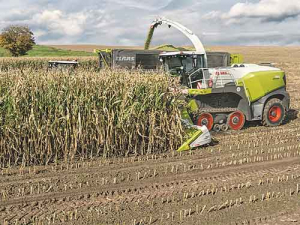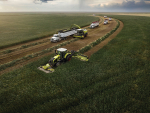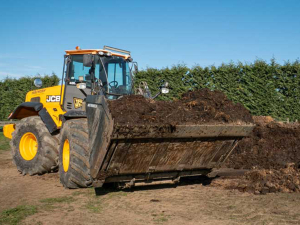German harvester manufacturer Claas, known for the rubber track system it developed 30 years ago, went on to refine it.
Now the Terra Trac system is a must-have for Lexion combine harvester users looking for less ground compaction and overall width, and much more traction, particularly on slopes.
At the recent Agritechnica in Hanover the company unveiled a similar system for its Jaguar self-propelled forage harvesters.
On the Jaguar, a headland protection system protects the soil profile and the grass plants as the machine turns at the end of a run.
In operation, the land wheel of each track is raised, leaving the machine’s weight to be carried by the rive wheel and middle rollers. As a result, the contact area and ground pressure changes briefly to match that normally imposed by 800mm diameter conventional tyres.
The improved design is affirmed by testing at the University of Kiel, Germany, that showed the technology reduces the undesirable ‘shear effect’ to just about the same level as on tractors with conventional tyres.
Jaguar Terra Trac systems use 635mm wide tracks that keep transport widths to about 3m and allow a top speed of 40km/h. As an option, 800mm wide tracks will help reduce ground compaction but increase transport width to 3.5m.
A further benefit is that the insertion and removal of the corn cracker modules is said to be easier, as tracked machines sit much lower than their conventional counterparts.











